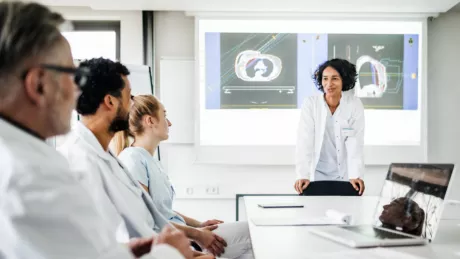
Why citizens should try out the online ID function of their ID card
published on 20.01.2020
Citizens can use the online ID function of their ID card to identify themselves securely on the Internet and use services by public authorities and the private sector with confidence. As everyday life becomes more and more digital, this function is becoming increasingly important. It’s time to take stock.
Using the online ID function with a smartphone is child’s play
Since 2017, anyone applying for a new ID card at a citizens’ office receives an ID card with the online ID function automatically activated, the so‑called eID function. In order to actually use this function online to register or login, citizens first have to change the transport PIN of their ID card to a user‑selected PIN. The number of citizens who use the eID function is growing.
And it is clear what citizens want: The vast majority of Germans want to handle matters with public authorities online. Almost two-thirds of the participants in a recent survey are of the opinion that most administrative procedures could be completed online without any difficulty.
In order to use online public services, unique identification of the person is required – and this means a login with a high security level. This is now child’s play when the online ID function is used together with a smartphone.
Offers for digital services are increasing
Admittedly, the type and scope of the applications currently available had been limited for a long time. For years now, citizens have already been able to check their pension account and apply for a pension, call up credit-rating data, request a police clearance certificate, register for the student-loan repayment procedure, submit petitions or check their penalty points in Flensburg online. However, these are applications that only a handful of citizens need regularly. But what few citizens know is that they can now use their ID card to identify themselves online at over 100 services. Over two thirds of these services are provided by public authorities. Numerous municipalities in Germany offer common public services online: Citizens can register, re-register and deregister their car online, apply for children’s allowance or confirmation of registration, report a change in address or request a postal vote. The other services are offered by companies that have been certified for the procedure, for example, some insurance companies, banks, Deutsche Bahn and Deutsche Post.
It is also worth looking to the future. Thanks to the Online Access Act (OZG, Onlinezugangsgesetz), there will soon be a lot of other digital services on offer that will save people from having to travel to the local town hall and wait around often for hours. According to the Online Access Act, public administrations in Germany are to make a total of 575 services available online. A mammoth project which, according to Klaus Vitt, the CIO of the federal government, also requires of the 16 federal states and almost 11,000 municipalities that they “overcome complex federal structures and fragmented responsibilities”. Planning and first implementations are already in full swing. Around 30 services will go online shortly, and all of the federal government’s important public services will go live by the end of 2021.
Security thanks to the German ID card
In the future, it will be more worthwhile for citizens to be ‘digitally literate’. In order to use the growing number of services available securely and conveniently, it makes sense to use the ID card with its online ID function. Anyone who registers online in this way protects themselves against identity theft and abuse. Another advantage of this is that with the help of the imported ID document, forms can be automatically completed with personal data. This saves time and reduces the risk of typing errors.
Today, citizens can choose between several options for using the online ID function. But whatever option they choose, they will need a reader. This is usually an NFC-enabled smartphone. The list of devices that can read the ID card is growing longer every month and can be viewed here. Together with AusweisApp, the data of the ID card can be used very easily for online registration. This app can be downloaded free of charge to the smartphone via the app stores of the two well-known smartphone systems (Android and iOS). Using the PIN chosen by the user, the personal data is then encrypted and transmitted to the online service. No data is transferred without the user’s consent.
Four layers of protection for personal data
When the ID card is used, four security mechanisms are in place to reliably protect personal data:
- Possession and knowledge
Only those who are in possession of the ID card and know the PIN can use the online ID function. This so-called two-factor authentication is more secure than the common one-factor authentication method that uses usernames and passwords. - Secure data transmission
The data is only transmitted when the ID card is held up to the reader, smartphone or tablet – and after the PIN has been entered. This means that the data cannot be read unbeknownst to the card holder. This is also the case if the ID card is stolen or lost. - Mutual identification
With the online ID function, both parties are always required to identify themselves. This allows the card holder to see exactly who the data is being sent to. The other party in the network must have a valid state-issued certificate to be able to retrieve the required data. This certificate can be displayed. The ID card holder must issue their consent before the data can be transmitted – and only the data actually required to use the online service. - Encryption
Only encrypted data is sent. This end-to-end encryption protects the data against theft and abuse.
There are therefore many good reasons to use the online ID function of the ID card. In addition, Apple smartphones were recently added to the list of devices. And should citizens forget their PIN or if the online ID function is deactivated, they can go to their registration office where they will quickly be helped and the function reactivated. For more information, go to the portal: https://www.personalausweisportal.de





